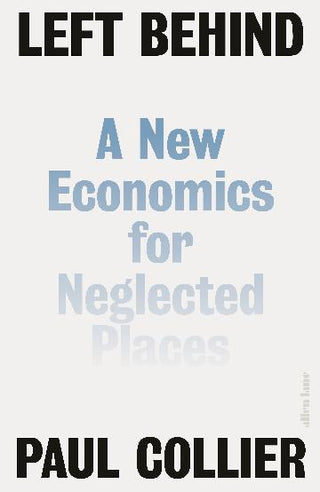Left Behind: A New Economics for Neglected Places
- Unit price
- / per
-
Author:Paul Collier
-
ISBN:9780241279168
-
Publication Date:September 2024
-
Edition:1
-
Pages:304
-
Binding:Hardback
-
Publisher:Allen Lane
-
Country of Publication:United Kingdom


A Back Order button means that we don’t have the book in stock at our store. It may already be on order – or we can order it for you from a publisher or distributor at no additional cost.
As we source items from around the globe, a back-order can take anywhere from 5 days to several weeks to arrive, depending on the title.
To check how long this might take, you’re welcome to contact us and we can provide an ETA or any other information you need. We recommend checking the timeframe before committing to an online order.
Left Behind: A New Economics for Neglected Places
- Unit price
- / per
-
Author:Paul Collier
-
ISBN:9780241279168
-
Publication Date:September 2024
-
Edition:1
-
Pages:304
-
Binding:Hardback
-
Publisher:Allen Lane
-
Country of Publication:United Kingdom
Description
Left behind places can be found in prosperous countries—from South Yorkshire, integral to the industrial revolution and now England’s poorest county, to Barranquilla, once Colombia’s portal to the Caribbean and now struggling. More alarmingly, the poorest countries in the world are diverging further from the rest of humanity. Why have these places fallen further behind? And what can we do about it?
World-renowned development economist Paul Collier has spent his life working in neglected communities. In this book he offers his candid diagnosis of why some regions and countries are falling further behind, and a new vision for how they can catch up. Collier lays the blame for widening inequality on stale economic orthodoxies that prioritise market forces and centralised bureaucracies like the UK Treasury. In contrast, a new wave of academic research has revealed the crucial role of collective learning, social capital and local agency in reversing decline and equalising life-chances.
Drawing on insights from social psychology, moral philosophy and behavioural economics, as well as a range of illuminating case studies, Collier shares a galvanising vision for a more inclusive, prosperous world.
Adding product to your cart
You may also like
A Back Order button means that we don’t have the book in stock at our store. It may already be on order – or we can order it for you from a publisher or distributor at no additional cost.
As we source items from around the globe, a back-order can take anywhere from 5 days to several weeks to arrive, depending on the title.
To check how long this might take, you’re welcome to contact us and we can provide an ETA or any other information you need. We recommend checking the timeframe before committing to an online order.
You may also like
You may also like
-
Left behind places can be found in prosperous countries—from South Yorkshire, integral to the industrial revolution and now England’s poorest county, to Barranquilla, once Colombia’s portal to the Caribbean and now struggling. More alarmingly, the poorest countries in the world are diverging further from the rest of humanity. Why have these places fallen further behind? And what can we do about it?
World-renowned development economist Paul Collier has spent his life working in neglected communities. In this book he offers his candid diagnosis of why some regions and countries are falling further behind, and a new vision for how they can catch up. Collier lays the blame for widening inequality on stale economic orthodoxies that prioritise market forces and centralised bureaucracies like the UK Treasury. In contrast, a new wave of academic research has revealed the crucial role of collective learning, social capital and local agency in reversing decline and equalising life-chances.
Drawing on insights from social psychology, moral philosophy and behavioural economics, as well as a range of illuminating case studies, Collier shares a galvanising vision for a more inclusive, prosperous world. -
-
Author: Paul CollierISBN: 9780241279168Publication Date: September 2024Edition: 1Pages: 304Binding: HardbackPublisher: Allen LaneCountry of Publication: United Kingdom
Left behind places can be found in prosperous countries—from South Yorkshire, integral to the industrial revolution and now England’s poorest county, to Barranquilla, once Colombia’s portal to the Caribbean and now struggling. More alarmingly, the poorest countries in the world are diverging further from the rest of humanity. Why have these places fallen further behind? And what can we do about it?
World-renowned development economist Paul Collier has spent his life working in neglected communities. In this book he offers his candid diagnosis of why some regions and countries are falling further behind, and a new vision for how they can catch up. Collier lays the blame for widening inequality on stale economic orthodoxies that prioritise market forces and centralised bureaucracies like the UK Treasury. In contrast, a new wave of academic research has revealed the crucial role of collective learning, social capital and local agency in reversing decline and equalising life-chances.
Drawing on insights from social psychology, moral philosophy and behavioural economics, as well as a range of illuminating case studies, Collier shares a galvanising vision for a more inclusive, prosperous world.-
Author: Paul CollierISBN: 9780241279168Publication Date: September 2024Edition: 1Pages: 304Binding: HardbackPublisher: Allen LaneCountry of Publication: United Kingdom
-



